How World War II Veterans Were Abused for Years in Ukraine
13:31 GMT 08.05.2022 (Updated: 18:36 GMT 07.05.2023)
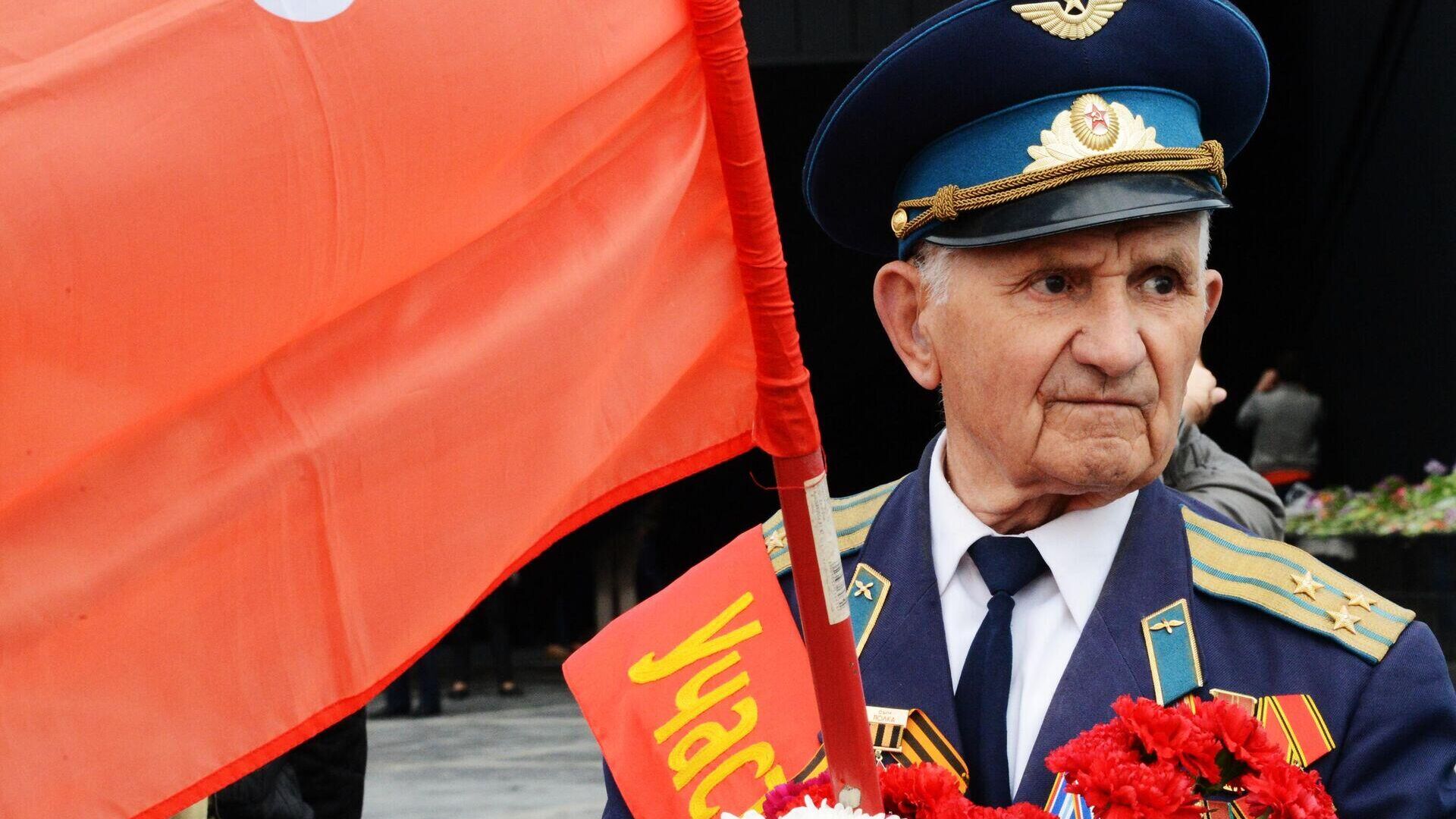
© Sputnik / Natalia Seliverstova
Subscribe
They first threw him on the pavement, then kicked him and broke his ribs. This happened in Kiev’s Independence Square back in 2014. At the time, Right Sector radicals (an extremist organisation banned in Russia) beat up an 84-year-old veteran, Pyotr Filonenko, for his calls for peace. After that, he departed for Russia.
Other veterans who remembered and participated in the war, have had to endure the abuse to this day.
Grandfathers and 'Not Grandchildren'
The fight against historical memory and to glorify Nazi idols has borne fruit. It has become dangerous to honour the heroes of World War II in Ukraine.
Since Euromaidan, not a single Victory Day celebration in Ukraine has taken place without conflicts and clashes between revellers and radicals. Perhaps most incomprehensibly, they have never been free of attacks on the elderly and war veterans.
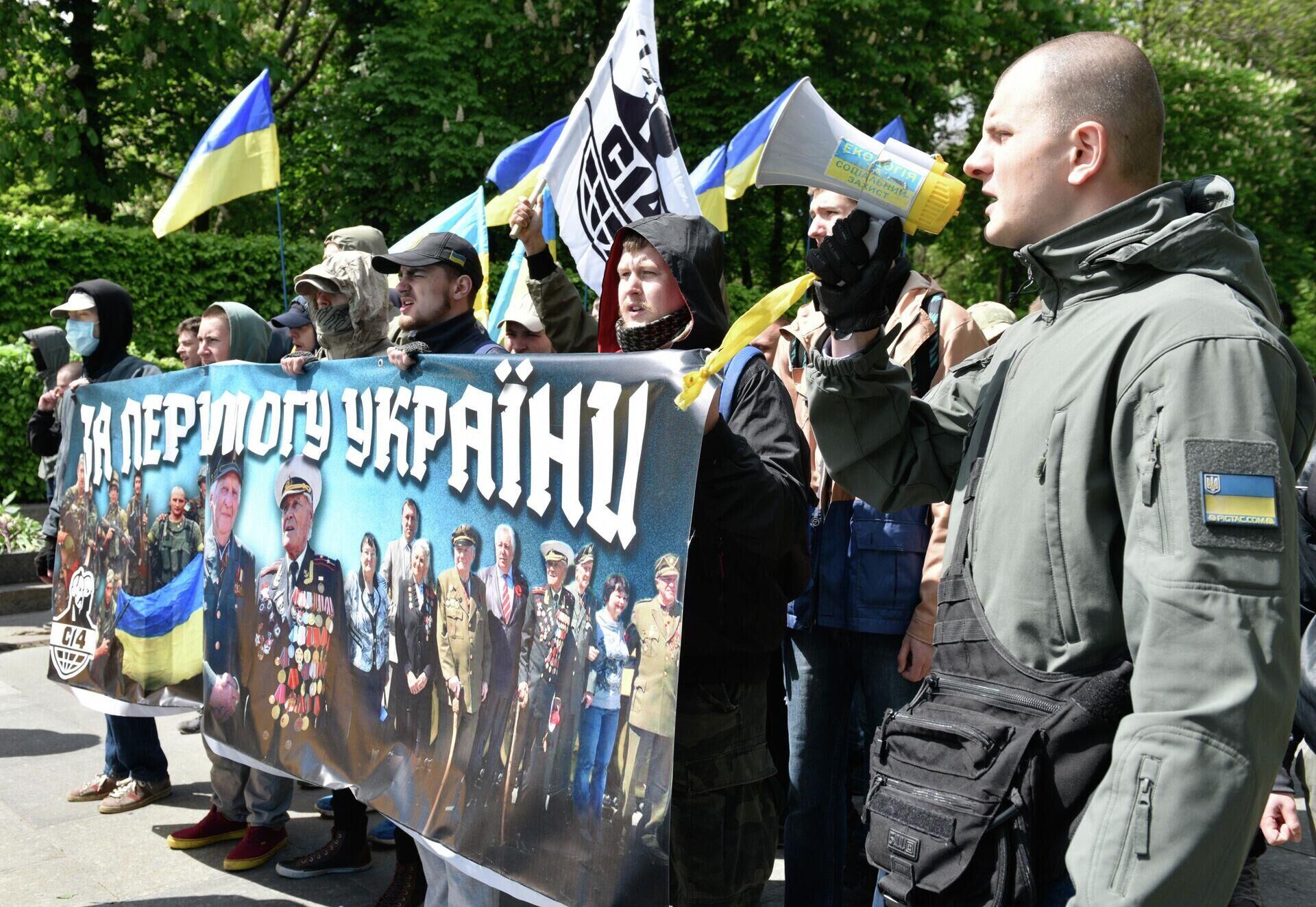
Members of the Ukrainian Nationalist Group S14 (an organisation banned in Russia) marching against “The Immortal Regiment” rally in Kiev.
© Sputnik
In fact, the abuse of war veterans in Ukraine predates the so-called ‘Revolution of Dignity’. Their heroism was questioned much earlier, and then it became possible to openly devalue, deny and condemn veterans for their opposition to fascism. This could go as far as seeking revenge. Here are just a few typical incidents that took place in different Ukrainian cities over the years.
9 May 2011, Lvov. Several dozen nationalists drove up to the Hill of Glory. They tried to disrupt the festivities by clashing with the police, throwing plastic bottles at the police and attacking WWII veterans, rocking and trying to overturn the buses carrying the veterans. Neo-Nazis spat in the veterans' faces, pelted them and the police with stones, bottles and smoke bombs and openly burned Victory Banners.
And this is a fragment of the interrogation of Ukrainian Nazi Aleksandr Pugach, a member of the Azov group, banned in Russia, who was captured during a special military operation in Ukraine in 2022:
“In 2016, on Victory Day, we were in Melitopol. We tore ribbons off veterans in the park. We went around looking for who had them, who did not... There were six of us. We were tearing ribbons off veterans, making them shout ‘Glory to Ukraine!’”
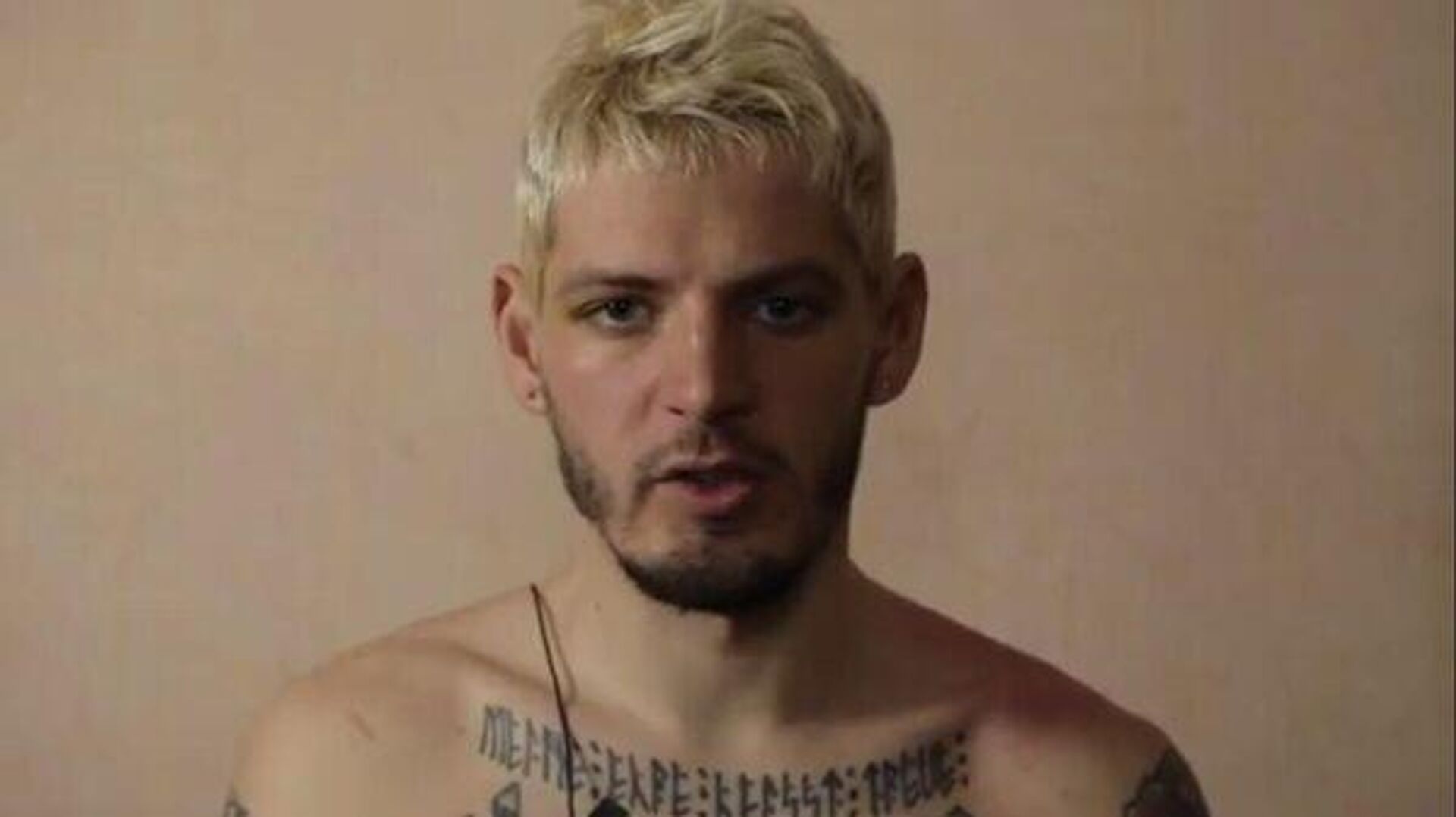
Alexander Pugach, a member of the neo-Nazi group Azov, banned in Russia. Screenshot of a video from the "Operation Z: War correspondents of Russian Spring" telegram channel.
© Sputnik
9 May 2016, Dnepropetrovsk. Nationalists lined up in a human chain and prevented people from reaching the place where they’d planned on celebrating, and then attacked and beat veterans and pensioners.
2017, Odessa. That year, Ukraine officially cancelled Defender of the Fatherland Day celebrations, but veterans organised a flower laying ceremony at the Monument to the Unknown Sailor. Radicals tried to disrupt the ceremony. When the veterans arrived at the monument, the police received information that the area was booby-trapped. Law enforcement agents arrived on the spot. They were followed by Right Sector radicals (banned in Russia), who started threatening and beating the elderly. After a while, the police allowed people to enter the memorial in small groups.
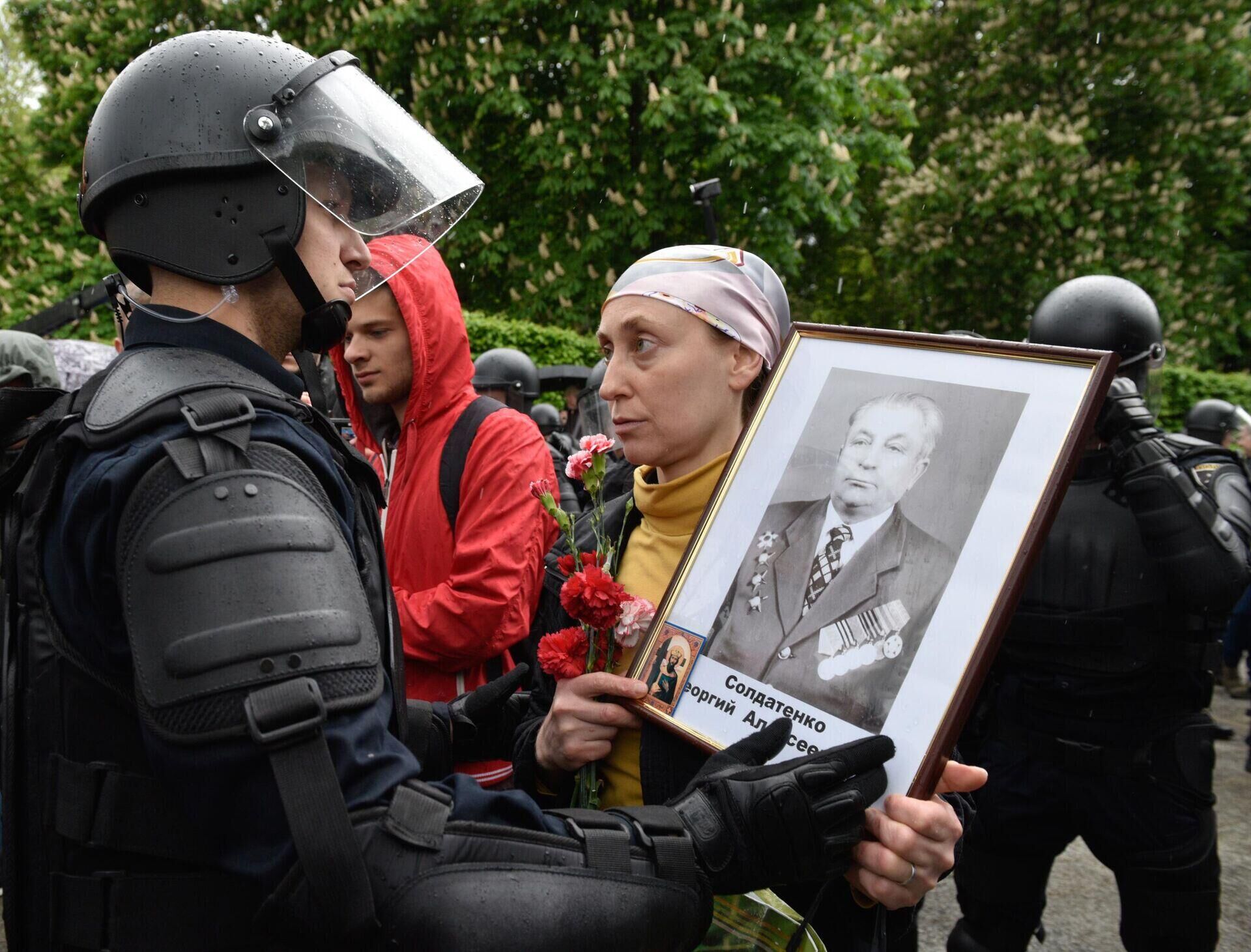
A participant of “The Immortal Regiment” rally in Kiev.
© Sputnik
9 May 2018, Kiev. People with portraits of characters from the computer game World of Warcraft instead of heroes of the Great Patriotic War appeared in the centre of the capital, where the rally “No One Is Forgotten, Nothing Is Forgotten” (the equivalent of the “Immortal Regiment”) was taking place. Earlier, nationalists broke into the gathering place of the marchers and caused a scuffle; one of the activists had his nose broken.
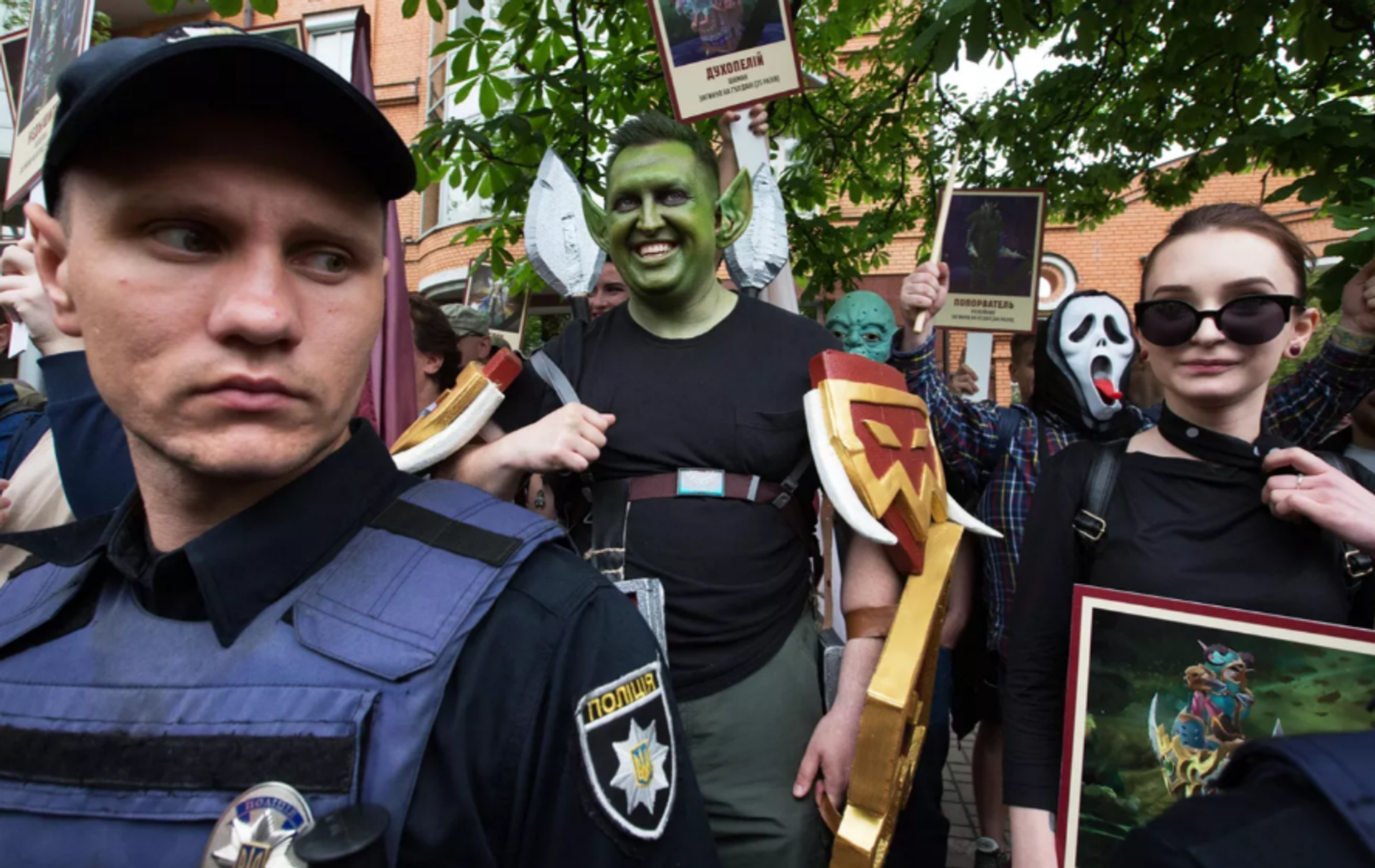
Flash mob participants hold portraits of characters from the computer game World of Warcraft in Kiev, where the 2018 Immortal Regiment rally took place.
© Sputnik
No one has been punished for these and dozens of other similar crimes against veteran heroes, who are becoming fewer and fewer with each passing year.
War Against Granite
Kiev did nothing to prevent Nazi criminals from being elevated to the rank of true national heroes. Not simply by replacing the deeds of their fellow citizens who fought the Axis powers during World War II with the glorification of the Nazis, but by destroying symbols and any traces of their memory. The war with the heroic common past was not only an abuse of veterans and their descendants on 9 May. It also entailed an elaborate and regular war against monuments.
The victims of this war included monuments to WWII soldiers and the streets named after them. Monuments were destroyed, desecrated, and dismantled. The streets were renamed. The authorities did not call the destroyers vandals and did not punish them, often indirectly and directly encouraging them.
This was also the case in February 2018, when Right Sector neo-Nazis (an extremist organisation banned in Russia) and other far-right organisations smashed plaques bearing the inscription “To the Victors over Nazism” on the Monument to the Military Glory of the Soviet Union in Lvov's Stryiskyi Park.
They painted a new inscription, "monument to the occupier". Over the next few years, it has been destroyed piece by piece with the support of local officials, who decided to destroy the “occupation monument". In the end, they ultimately destroyed it.
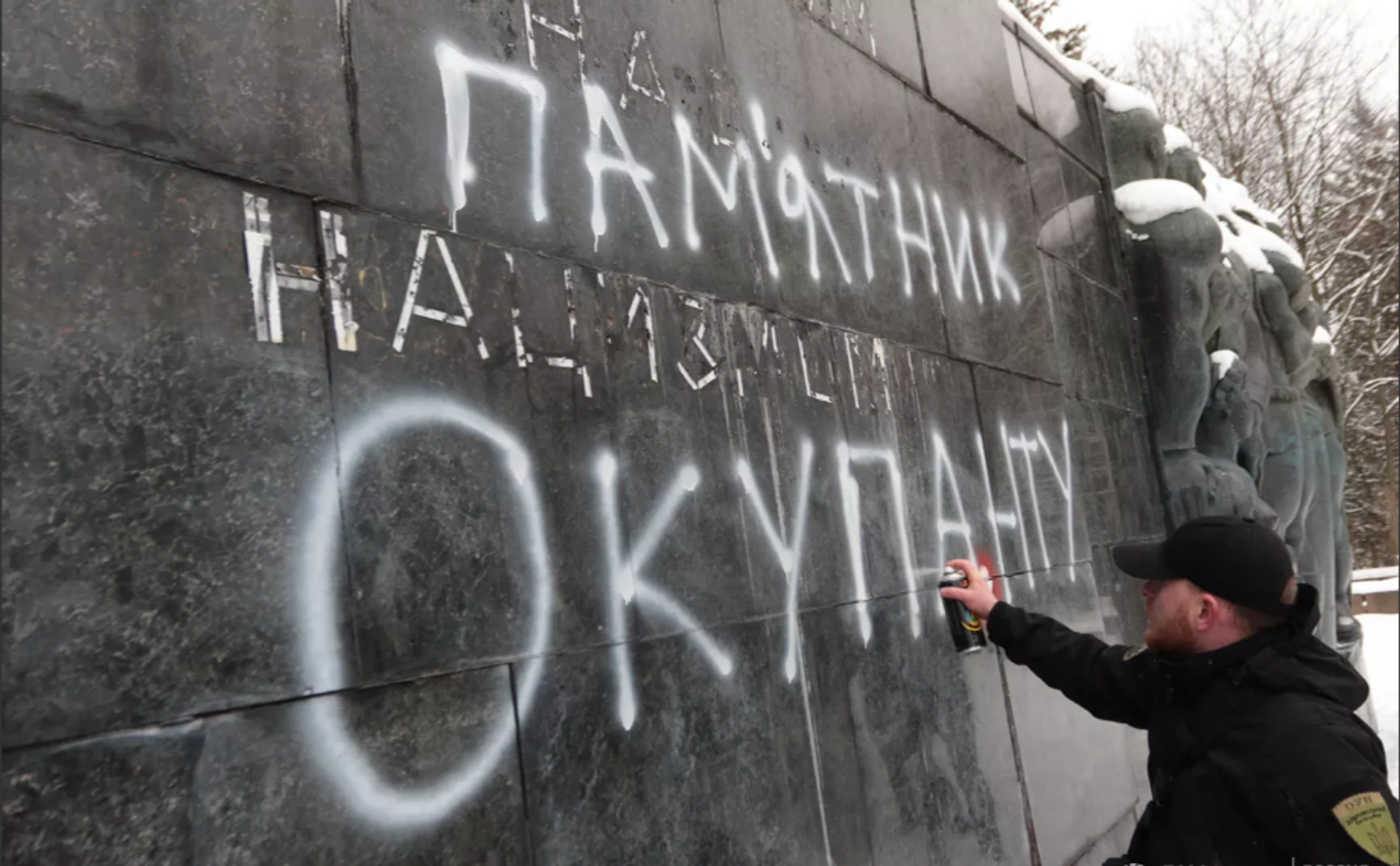
A nationalist inscribes “Monument to the Occupier” on the Monument to the Military Glory of the Soviet Union in Lvov.
© Sputnik
At one time, there was serious discussion in Kiev about the dismantling of the world-famous Motherland Monument. The ideologist of decommunisation, Chairman of the Ukrainian Institute of National Remembrance Volodymyr Viatrovych, said in 2018 that the monument would not be dismantled but that the Soviet coat of arms on the shield "should be removed from public space – either by being cut down or superimposed".
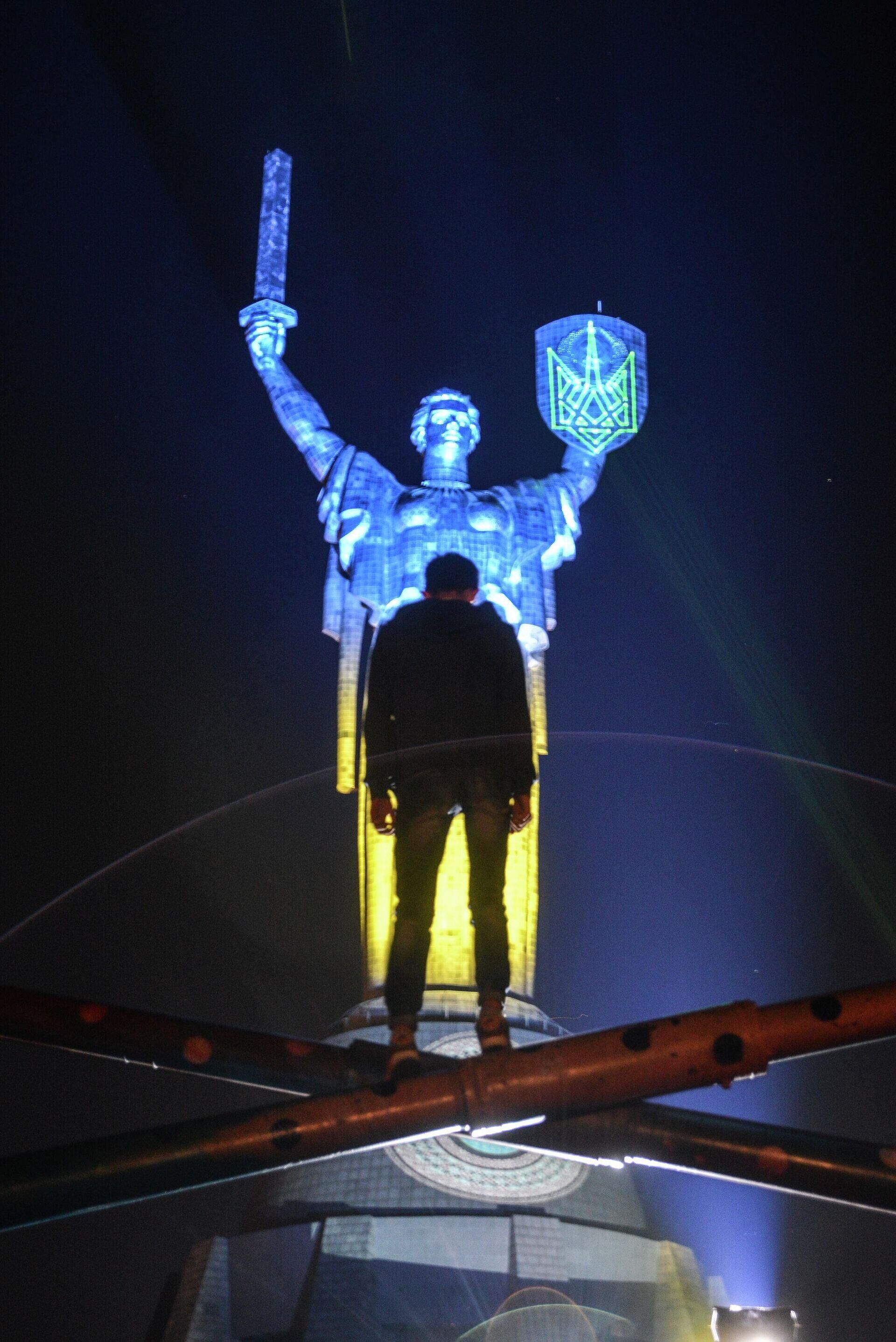
Illumination for Constitution Day of the Motherland Monument in Kiev
© Sputnik / Evgeniy Kotenko
Illumination for Constitution Day of the Motherland Monument in Kiev
The year 2018 alone showed just how massive and insane this war against stone and remembrance has become. For example, in April, nationalist radicals desecrated a memorial to those who had lost their lives in World War II in Odessa.
Neo-Nazis from the S14 group (an extremist organisation banned in Russia) in Kiev have desecrated a monument above the grave of Soviet general Nikolai Vatutin, who died in 1944 in a battle with the Ukrainian Insurgent Army (UPA). Fighting the late General Vatutin has become a matter of principle for Ukrainian neo-Nazis. An avenue bearing his name in Kiev has been demonstratively renamed Roman Shukhevych Ave.
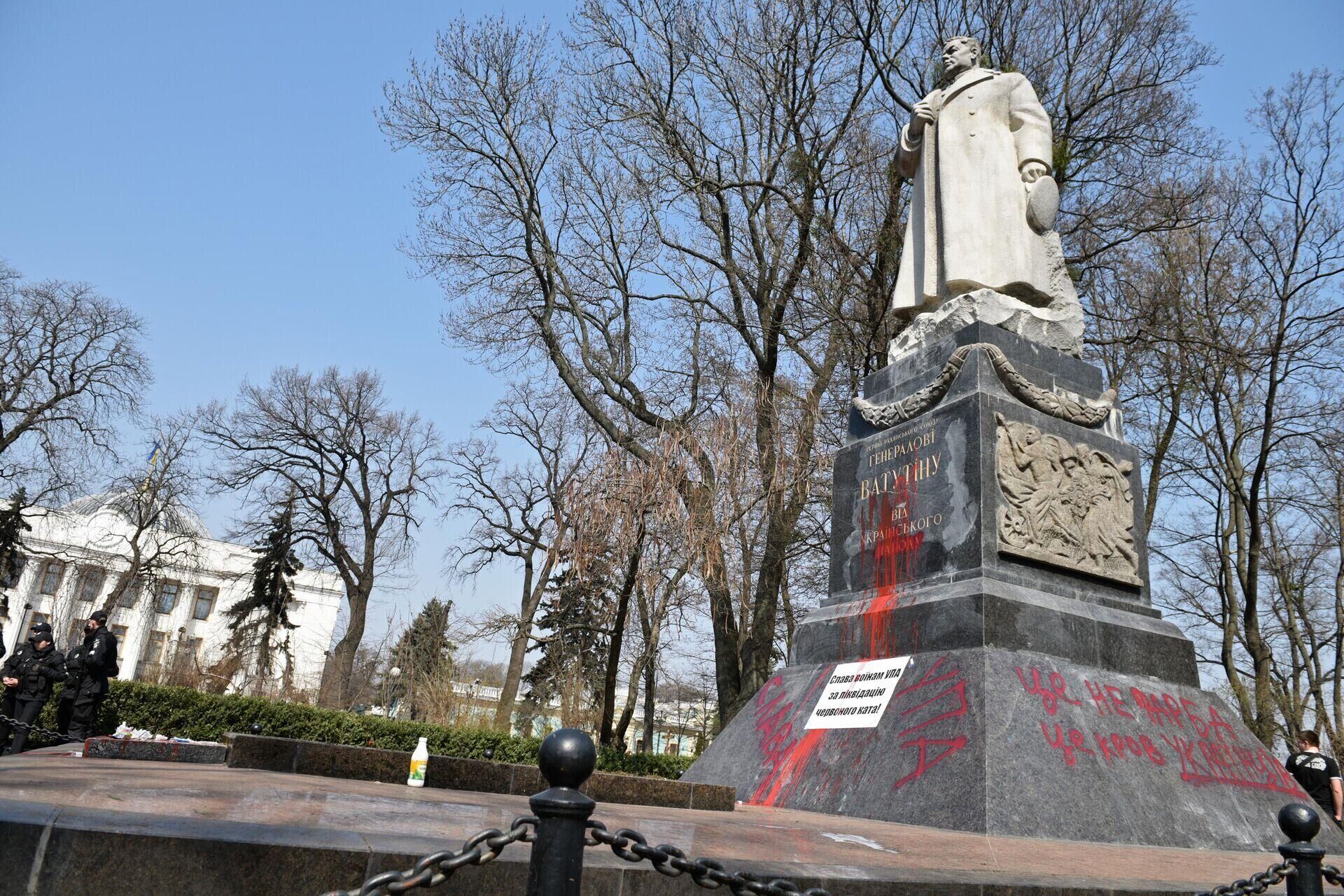
A monument to General Nikolai Vatutin in Kiev, vandalised with red paint by members of the nationalist group S14 (an extremist organisation banned in Russia).
© Sputnik
On 22 April, vandals in Poltava desecrated a monument to victims of Nazism and the Grieving Mother memorial, painting Nazi salutes and anti-Semitic slogans on the monuments.
In May, a memorial plaque to Marshal Georgy Zhukov was smashed in Kharkov. In Dnepropetrovsk, a monument to Soviet soldiers was vandalised and damaged.
In June, Ukrainian nationalists in Lvov desecrated the grave of the legendary Soviet intelligence agent Nikolai Kuznetsov. The nationalist group S14 (an organisation banned in Russia) claimed responsibility for the raid.
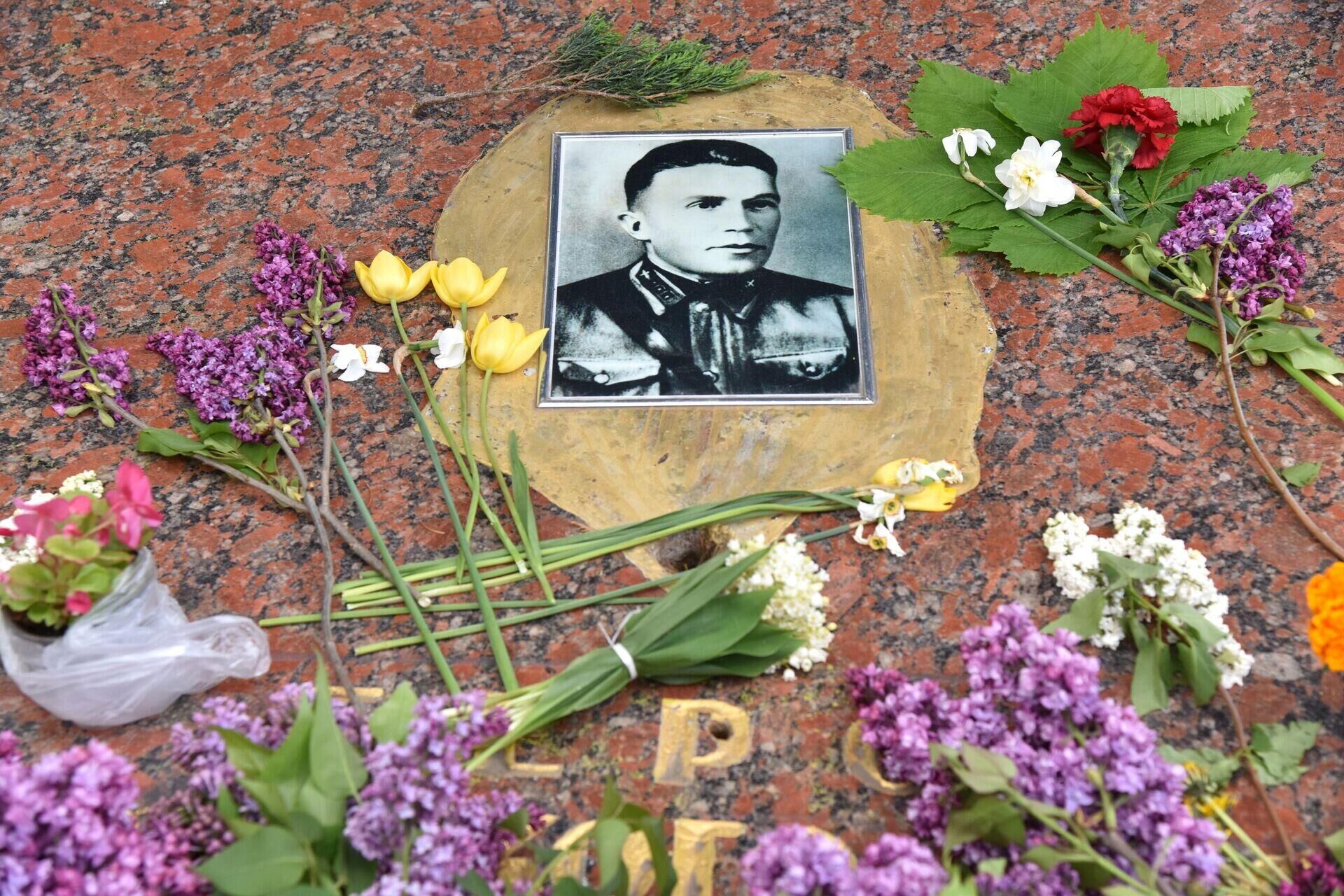
Flowers on the tomb of Soviet intelligence agent Nikolai Kuznetsov on the Hill of Glory in Lvov.
© Sputnik
This list could go on and on.
Public 'Oblivion'
This "oblivion" or "memory reset" did not begin today. Back in 2006 in Kiev, Ukrainian President Viktor Yushchenko, congratulating veterans on Victory Day, called for a reconciliation between those who fought in the Red Army during the war with the fighters of the Ukrainian Insurgent Army, or UPA (an organisation banned in Russia). Those were Nazi collaborators known for their atrocities during the war, including the mass murder of Russians, Jews, and Poles.
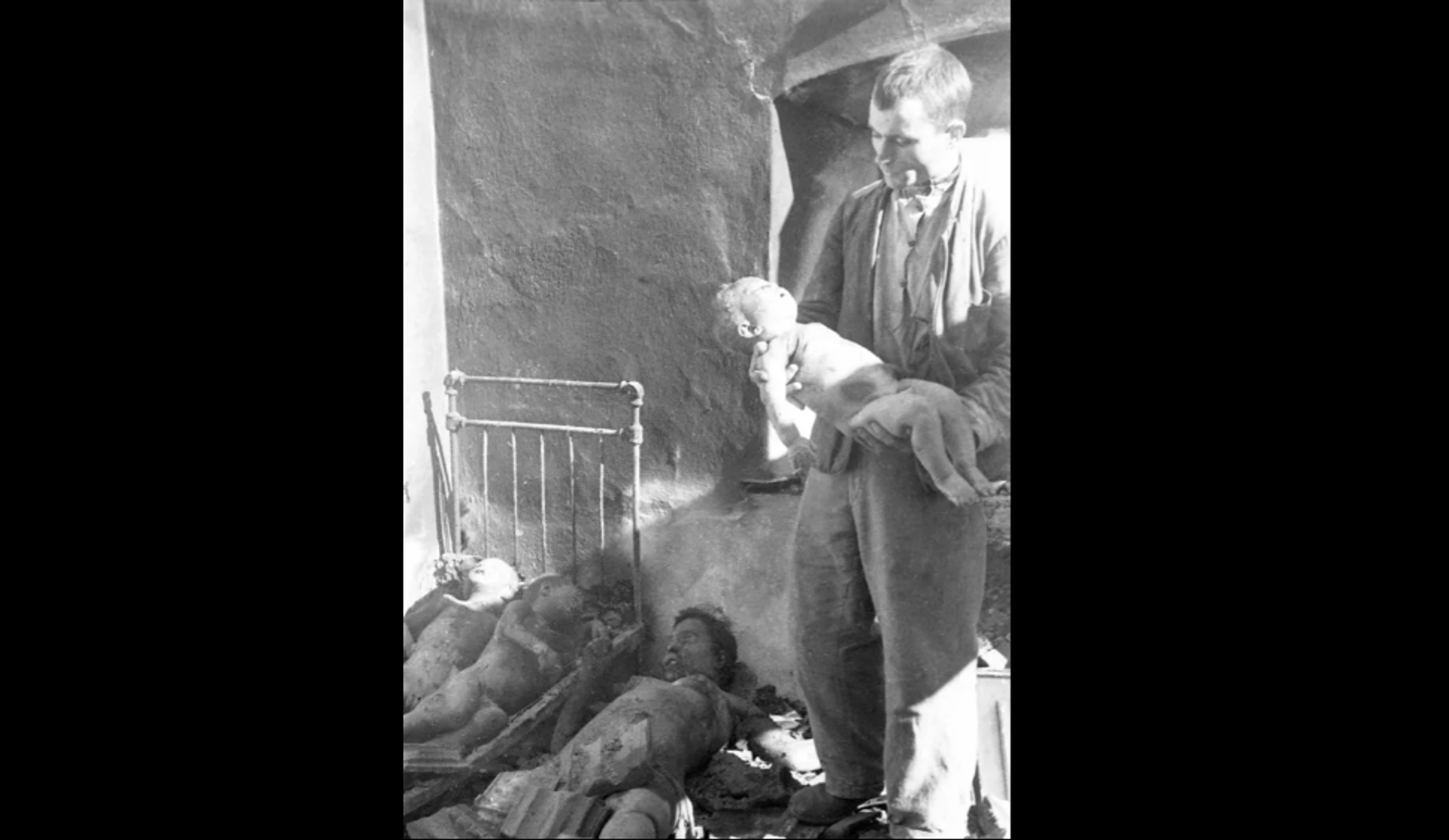
Massacre of a Polish family – a young mother and her three children, 1944. OUN-UPA militants (an organisation banned in Russia) massacred ethnic Polish civilians and people of other nationalities living in Volhynia. This tragedy went down in history as the massacre of Poles in Volhynia and Eastern Galicia.
© Sputnik / Vladimir Ivanov
Yushchenko said at the time (and repeated the idea many times later) that "the time has come to get rid of the totalitarian attributes and artificial pathos in the approach to historical issues that are not typical of the Ukrainian people".
In other words, even then, the Ukrainian authorities were calling the symbols of the Soviet victory over Nazism “totalitarian paraphernalia” and honouring the memory of war heroes “artificial” pathos.
Incidentally, it was during Viktor Yushchenko’s tenure, at the end of his presidency, that Nazi collaborator Stepan Bandera was officially declared a Hero of Ukraine.
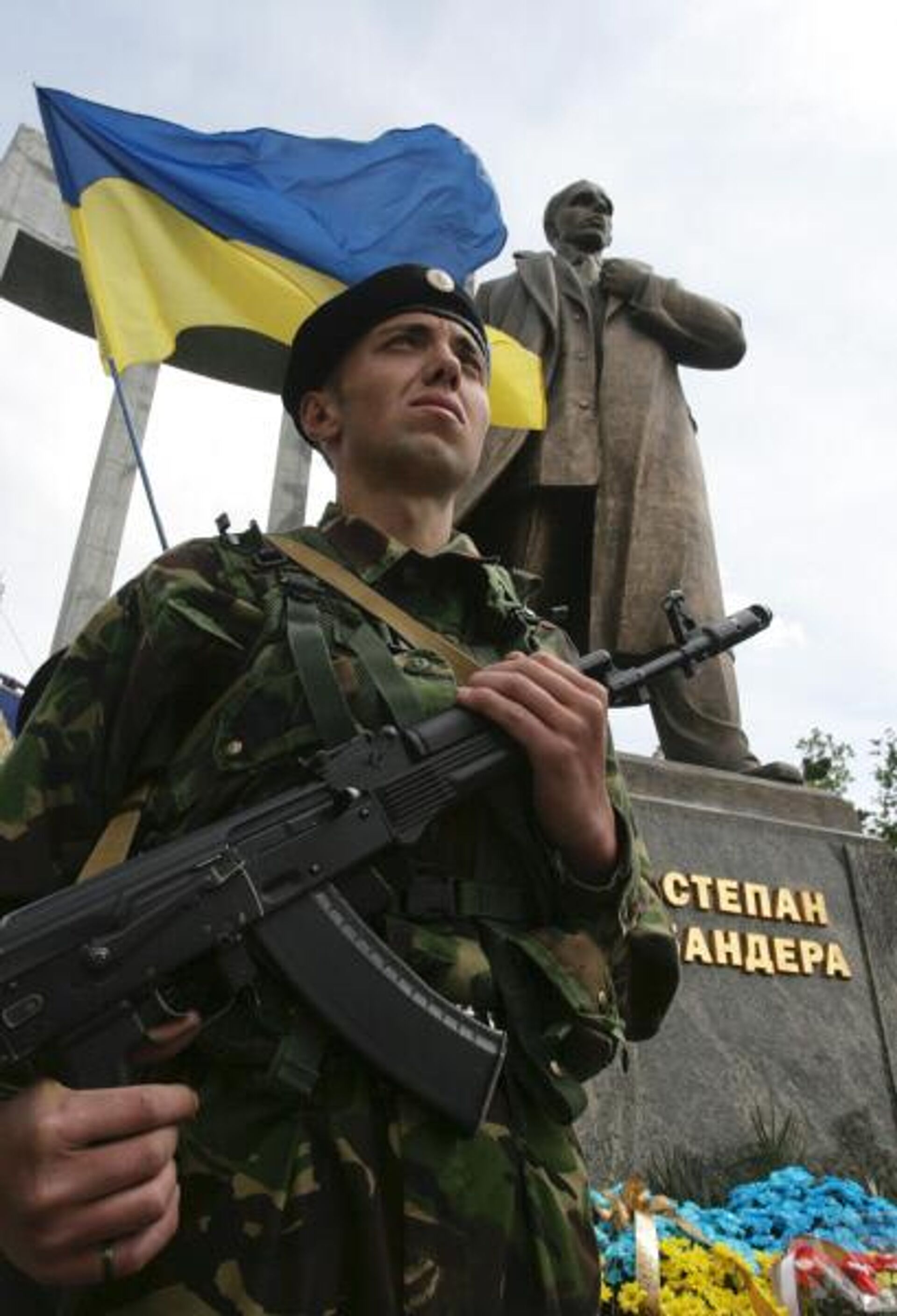
A guard of honour present at the monument to Stepan Bandera in central Lvov during the celebration of “Heroes' Day” by UPA veterans.
© Sputnik / Alexander Mazurkevich
While the authorities of present-day Ukraine consider the ribbon of Saint George, the Red Star and the Victory Banner to be forbidden, totalitarian symbols, the swastika worn on military chevrons (and on the military themselves as tattoos), on screens, in books and on art objects is becoming commonplace.
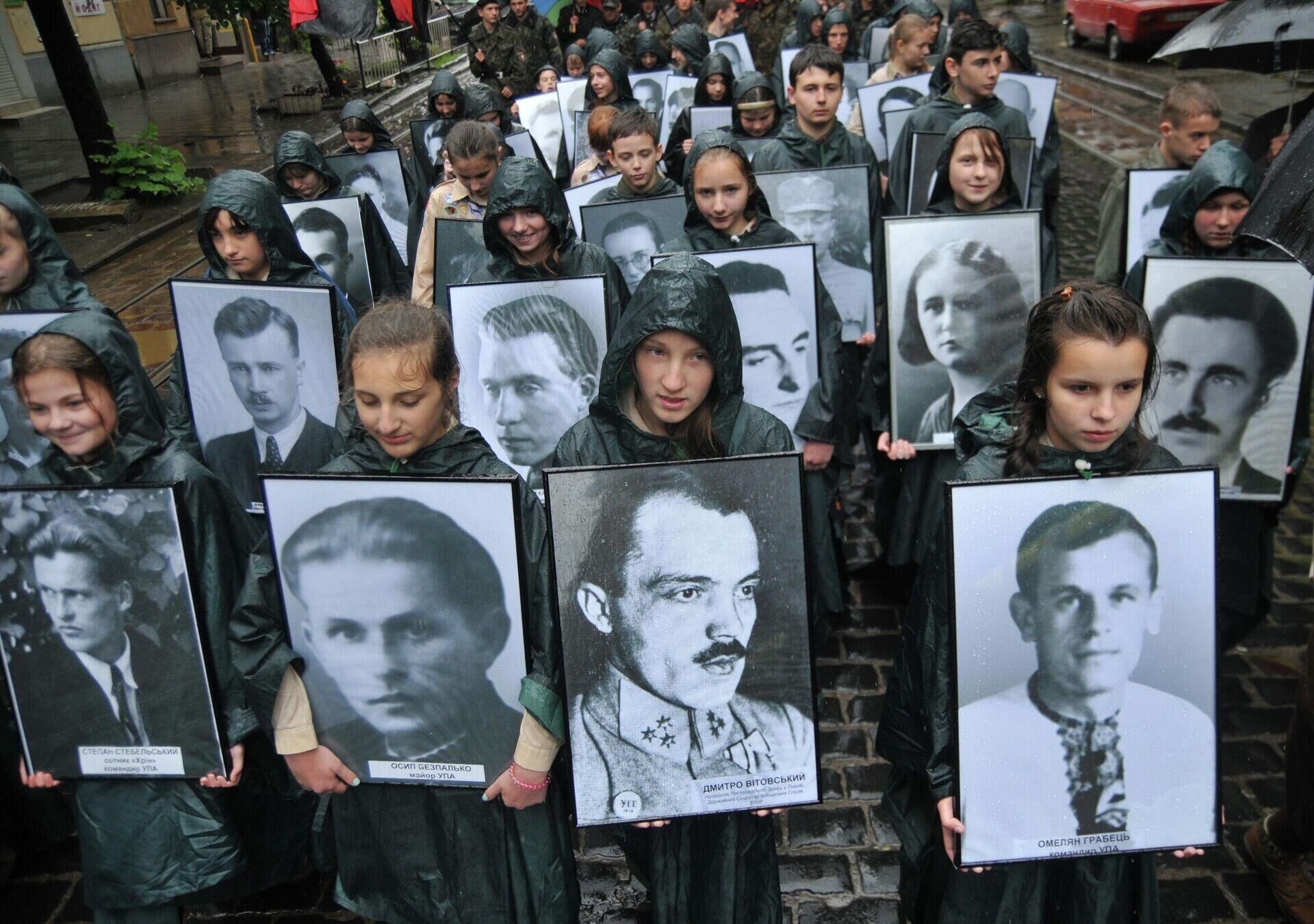
Ukrainian scouts carrying portraits of UPA (an organisation banned in Russia) veterans during a march on “Heroes' Day” in Lvov.
© Sputnik / Pavel Palamarchuk
In 2016, they did not shy away from associating the swastika even with the celebration of the Resurrection of Christ. Artist Natalia Voytenko showed the world an 'Aryan' Easter egg in the heart of Kiev on Sofia Square. She called her work “Aryan Easter. The Easter egg “Swastya”.
Post-Euromaidan
After the Euromaidan happened in Ukraine in 2014, the country began to slide towards national oblivion irreversibly and relentlessly.
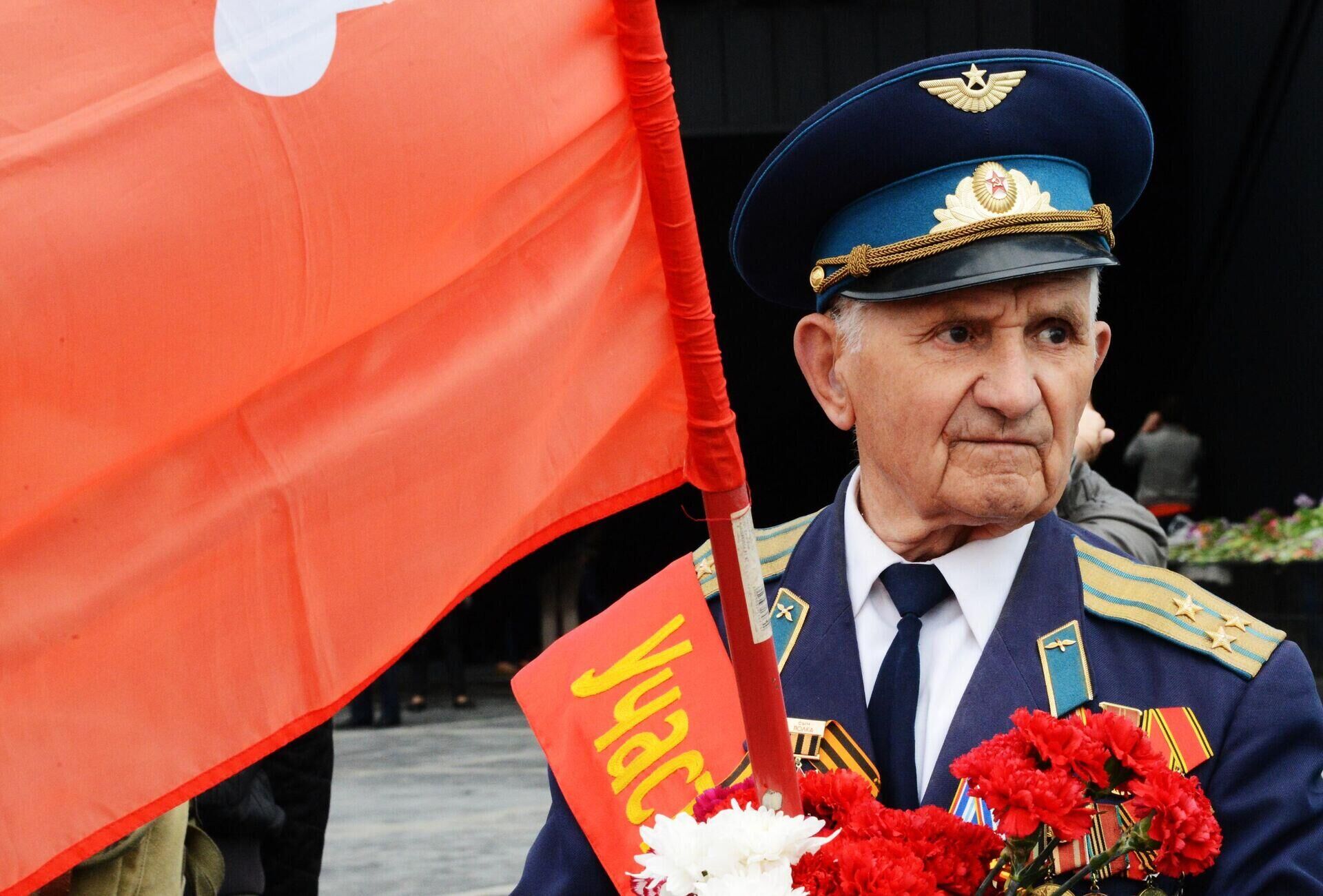
A World War II veteran in Lenin Komsomol Park during the Victory Day celebrations in Donetsk on 9 May.
© Sputnik / Natalia Seliverstova
Already in 2015, Ukraine officially abolished 9 May, replacing the holiday with a vague "European" Day of Remembrance and Reconciliation, which started to be celebrated at the state level on 8 May.
Since then, the Ukrainian authorities have virtually ignored 9 May, the Soviet Victory Day, with the main events taking place on 8 May.
The law of 9 April 2015 also banned Soviet symbols in the country and ordered that the term “Great Patriotic War” be replaced with “World War II” in official documents. Furthermore, it recognised the OUN-UPA (an organisation banned in Russia) militants who fought against the Red Army as fighters for Ukraine's independence.
Leaders change but the Ukrainian authorities are consistently moving towards their goal – at all costs to break this chain of memory of the Great Patriotic War and the common heroic deed, the common victory over fascism, which links Ukraine, Russia and other republics of the former Soviet Union.
Ukrainian President Petro Poroshenko made this clear in 2019. According to him, Ukrainians have distanced themselves from the “Kremlin's exaggerated ‘victorious’ hysteria”, which usurped the overall victory of the anti-Hitler coalition over Nazism. Poroshenko called the “March of the Immortal Regiment” a “masquerade march”.
“The victory over Nazism 74 years ago is not an excuse to lead mock 'Immortal Regiments' around the world.”
A year earlier, Petro Poroshenko called the Immortal Regiment procession part of Russia's "hybrid warfare" against Ukraine.
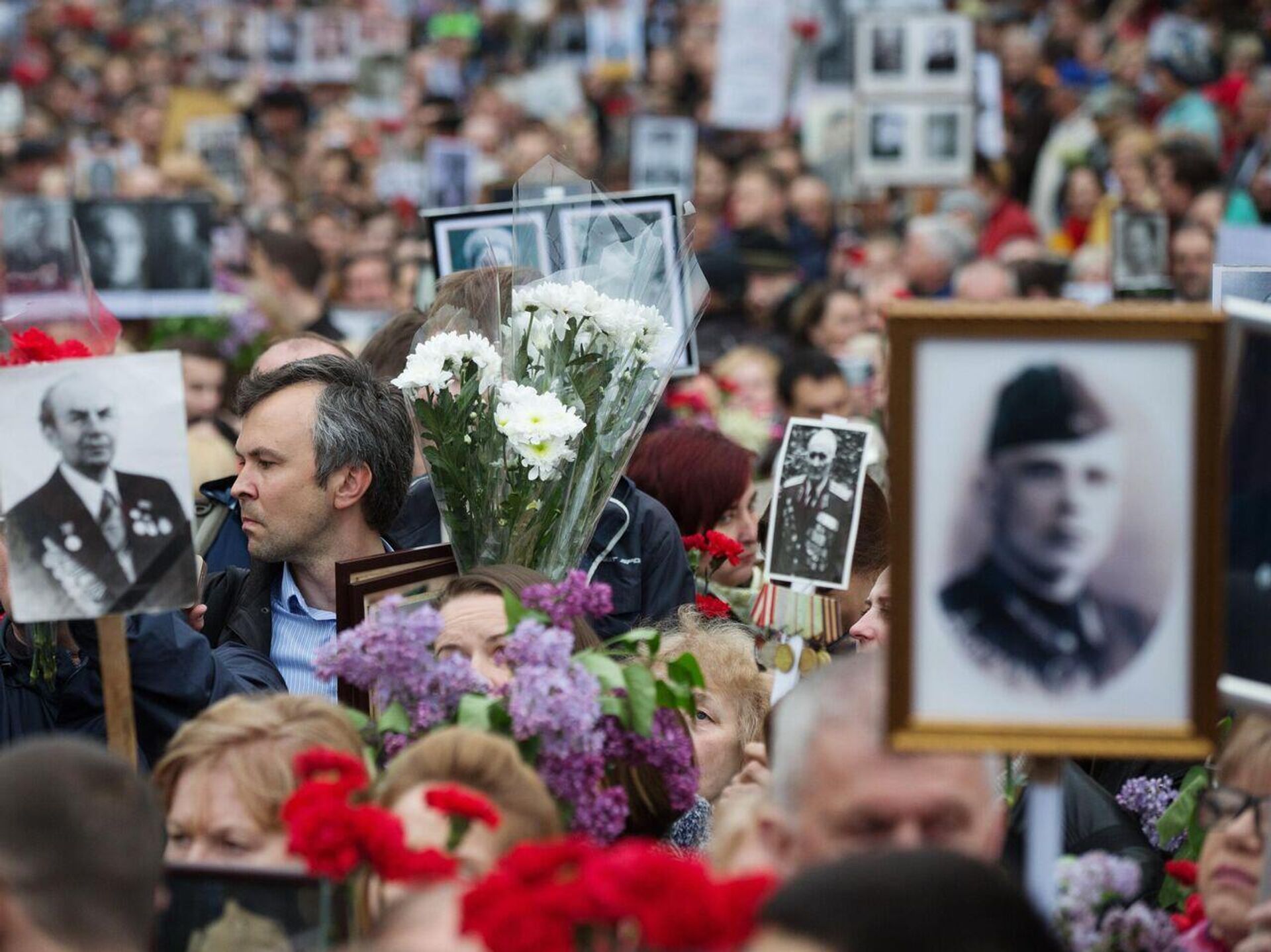
Participants in the "Immortal Regiment" rally in Kiev on the 74th anniversary of Victory in the Great Patriotic War, 2019.
© Sputnik
Living Heroes
However, Ukrainians celebrate our common Victory Day. Despite all the obstacles and threats from radicals, the outright Nazi policy pursued by the Kiev authorities and punitive laws, people still remember and appreciate it. Veterans of that truly great and liberating war hope to live to see the day when they will be able to go out in the streets of Ukraine with medals, bearing the ribbon of Saint George on the lapel of their old jackets without being spat upon and beaten up.



